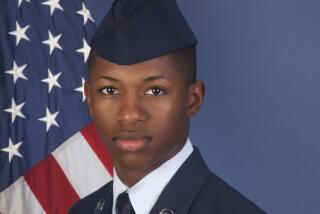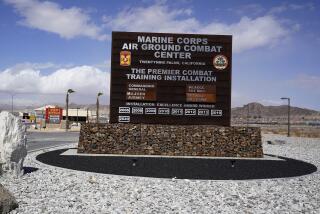El Toro Officer Defends Self, Mourns Friend
- Share via
EL TORO — A senior officer at the Marine Corps Air Station here, targeted in a probe that might have prompted the suicide of his best friend, defended himself Wednesday against allegations of official misconduct and called the incident involving the two men “a nightmare.”
In an emotional telephone interview, Col. Joseph E. Underwood said he “would love to give my side of the story” but was prevented from discussing specifics of the case because of an ongoing military investigation.
“How do you defend yourself against an anonymous hot line?” the Marine veteran of 29 years said, referring to an unnamed tipster who called the El Toro base to report suspicions about the use of base planes.
Underwood, formerly chief of staff at El Toro, and Col. James E. Sabow, an assistant chief for operations, were stripped of their duties earlier this month amid an investigation into the use of C-12 twin-engine turboprop planes for personal activities. A source also said that investigators were looking into allegations that Underwood may have improperly charged hotel and car-rental expenses to the military while attending an out-of-town golf tournament.
On Tuesday, the 51-year-old Sabow killed himself with a shotgun at his home on the base, authorities said. A family friend said Sabow’s wife returned home from morning services at a Catholic church to discover his body on the patio.
A father of two, Sabow was a veteran of 28 years in the Marines who received the Bronze Star for flying combat missions in Vietnam. He oversaw air operations at El Toro and three other Marine Corps air bases in the West.
Underwood blamed the death of his one-time flight-school partner and next-door neighbor on what he called a tragic misunderstanding over flight-time policy.
“He was as close to the perfect officer as anybody I’ve ever known,” Underwood said.
As further details of the case emerged Wednesday, the military acknowledged for the first time that the investigation centers on “possible misuse of aircraft.”
In the case of Underwood, Sabow’s immediate superior, military sources alleged that some of his personal trips involved weekend golf excursions to the East Coast and elsewhere to play golf recreationally or in military tournaments.
Underwood is a competitor in the senior division of the nationwide All-Marine golf tournaments, the premiere showcase of the sport in the corps. Competitors in that tournament have their travel expenses, normally for commercial flights, paid for by the military.
According to sources close to the Underwood family, the colonel contended that by using a military plane, he was actually saving the government money and, at the same time, getting in the flight hours needed to keep his pilot’s status active.
As one military source close to the case put it, the dispute is a “chicken-and-egg” question: Did Underwood use the trips to get in flight hours and, once at his destination, then do some golfing; or was he using military planes to play golf, behind the guise of putting in flight-time hours?
It is unclear how Sabow is alleged to have used base planes improperly, but sources said military investigators are looking into whether, as supervisor of air operations, he tolerated suspected misuse of the planes by his friend, Underwood.
Underwood defended his own reputation and the memory of his “best friend.” He said he himself had done nothing wrong and described Sabow as “a wonderful husband, father, officer.”
The colonel said he made his plane trips to keep his active status as a pilot, not to bill the government for his golfing excursions. “I’ve got to get in flight time in that aircraft,” he said, referring to the C-12 Beechcraft owned by the military.
The investigation into the use of base planes began earlier this month after an anonymous call to a Department of Defense hot line set up to report suspicions of misconduct and fraud.
Underwood suggested that the investigation and his Jan. 12 suspension were a result of people he angered during his three years as chief of staff at El Toro.
“I’m like the mayor of this place,” he said. “I make a lot of decisions, and you can’t please everybody.”
A Marine spokeswoman declined to respond to Underwood’s comments. The only official response from the base Wednesday came in a statement from Brig. Gen. Wayne T. Adams, the base commander, who said: “This will be a thorough investigation into the allegations. I intend to ensure that justice is served.”
El Toro officials declined to discuss base policy on officers’ use of aircraft. But retired Marine Brig. Gen. David V. Shuter, who headed the base until last year and assigned Sabow to his post as assistant chief, said his top administrators “would be expected to earn their flight pay by keeping up a proficiency on an aircraft.”
Shuter said it would not matter whether this was done during the week or on the weekend, as long as the flight hours were logged. Some Marine aviators are paid extra if they maintain a current active flight status by putting in a certain number of hours in the air.
“It’s a terrible tragedy, the loss of a very fine Marine officer, a very fine individual, the loss of a tremendous career to the Marine Corps and the country,” the general said of Sabow’s death.
Even beyond El Toro, word of the suicide was the talk of some Marine briefings and troop assemblies around the area Wednesday.
“That’s pretty big-time when a colonel commits suicide,” said one Marine officer at Camp Pendleton, adding that the subject came up there at a meeting. “I’m kind of curious to see from a personal standpoint what the charges were that could have been so horrendous.”
More to Read
Sign up for Essential California
The most important California stories and recommendations in your inbox every morning.
You may occasionally receive promotional content from the Los Angeles Times.














